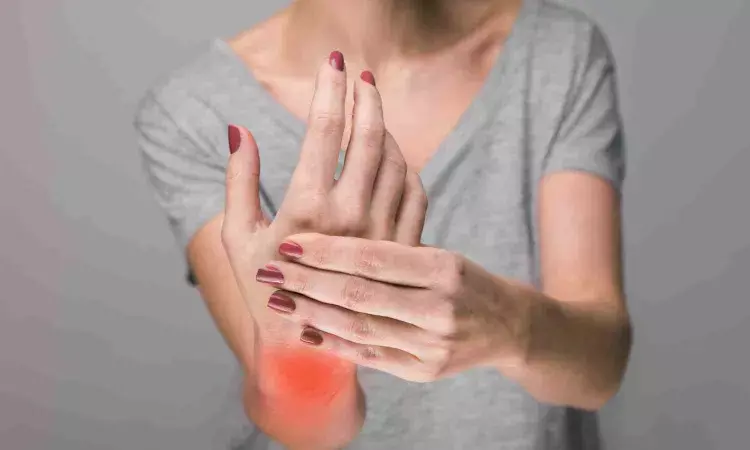- Home
- Medical news & Guidelines
- Anesthesiology
- Cardiology and CTVS
- Critical Care
- Dentistry
- Dermatology
- Diabetes and Endocrinology
- ENT
- Gastroenterology
- Medicine
- Nephrology
- Neurology
- Obstretics-Gynaecology
- Oncology
- Ophthalmology
- Orthopaedics
- Pediatrics-Neonatology
- Psychiatry
- Pulmonology
- Radiology
- Surgery
- Urology
- Laboratory Medicine
- Diet
- Nursing
- Paramedical
- Physiotherapy
- Health news
- Fact Check
- Bone Health Fact Check
- Brain Health Fact Check
- Cancer Related Fact Check
- Child Care Fact Check
- Dental and oral health fact check
- Diabetes and metabolic health fact check
- Diet and Nutrition Fact Check
- Eye and ENT Care Fact Check
- Fitness fact check
- Gut health fact check
- Heart health fact check
- Kidney health fact check
- Medical education fact check
- Men's health fact check
- Respiratory fact check
- Skin and hair care fact check
- Vaccine and Immunization fact check
- Women's health fact check
- AYUSH
- State News
- Andaman and Nicobar Islands
- Andhra Pradesh
- Arunachal Pradesh
- Assam
- Bihar
- Chandigarh
- Chattisgarh
- Dadra and Nagar Haveli
- Daman and Diu
- Delhi
- Goa
- Gujarat
- Haryana
- Himachal Pradesh
- Jammu & Kashmir
- Jharkhand
- Karnataka
- Kerala
- Ladakh
- Lakshadweep
- Madhya Pradesh
- Maharashtra
- Manipur
- Meghalaya
- Mizoram
- Nagaland
- Odisha
- Puducherry
- Punjab
- Rajasthan
- Sikkim
- Tamil Nadu
- Telangana
- Tripura
- Uttar Pradesh
- Uttrakhand
- West Bengal
- Medical Education
- Industry
Increased Physical Activity and Reduced Sedentary Behavior tied to Improved Vascular Health in RA: Study

Brazil: A recent study found that sedentary behavior (SB) is negatively associated with vascular health in postmenopausal women with rheumatoid arthritis (RA), and light physical activity (PA) is positively associated with vascular health.
The research, published online in the American Journal of Physiology: Heart and Circulatory Physiology, highlights the significant role that physical activity and reduced sedentary time can play in improving vascular function among individuals with RA.
Rheumatoid arthritis is a chronic autoimmune condition that affects the joints and increases the risk of cardiovascular disease. This heightened risk is partly due to systemic inflammation, which can damage blood vessels and lead to poor vascular health. Traditionally, treatment for RA focuses on controlling inflammation and managing joint symptoms, but there is growing recognition of the importance of improving cardiovascular health in these patients. While physical activity is widely recommended for managing cardiovascular health in RA, there is limited evidence on the specific relationships between objectively measured PA and vascular health markers in individuals with RA.
To fill this knowledge gap, T. Peçanha, Manchester Metropolitan University, Manchester, UK, and colleagues conducted a cross-sectional study involving 82 postmenopausal women with rheumatoid arthritis, averaging 62 ± 7 years. The participants underwent ultrasound assessments to evaluate vascular function and structure. These assessments included measurements of the brachial and superficial femoral artery (BA and SFA) flow-mediated dilation, baseline and post-hyperemia peak diameters, and carotid intima-media thickness, key indicators of vascular health.
Participants also completed a 7-day accelerometer-based assessment to measure physical activity and sedentary behavior. To examine the relationships between vascular health and PA outcomes, regression models were applied, adjusting for factors such as age, body mass index, and disease activity.
The regression analyses revealed the following key findings:
Sedentary Behavior:
- Prolonged bouts of sedentary behavior (>60 minutes) and total sedentary time were negatively associated with both baseline and peak brachial artery (BA) diameters.
- For each additional hour of sedentary behavior, there was a decrease of 0.08-0.1mm in both baseline and peak BA diameters.
- Total sedentary time was negatively associated with peak superficial femoral artery (SFA) diameters, with a β value of -0.14.
Physical Activity:
- Light-intensity physical activity and stepping time were positively associated with baseline and peak BA diameters.
- For each additional hour of light-intensity PA, the diameters of the BA increased by 0.10-0.24mm.
- Standing time was positively associated with peak SFA diameter, with a β value of 0.11.
Moderate-to-Vigorous PA:
- There were no significant associations between moderate-to-vigorous physical activity and vascular outcomes.
"These findings suggest that reducing sedentary behavior and increasing light-intensity physical activity may positively impact vascular health in postmenopausal women with rheumatoid arthritis," the researchers concluded.
Reference:
Meireles, K., Peçanha, T., Pinto, A. J., Santos, L. P., Mazzolani, B. C., Smaira, F. I., Rezende, D., M. Ribeiro, A. C., S. Pinto, A. L., Lima, F. R., D. Silva, J. N., Forjaz, L. M., Gualano, B., & Roschel, H. (2024). Improved vascular health linked to increased physical activity levels and reduced sedentary behavior in rheumatoid arthritis. American Journal of Physiology-Heart and Circulatory Physiology. https://doi.org/H-00640-2024
Dr Kamal Kant Kohli-MBBS, DTCD- a chest specialist with more than 30 years of practice and a flair for writing clinical articles, Dr Kamal Kant Kohli joined Medical Dialogues as a Chief Editor of Medical News. Besides writing articles, as an editor, he proofreads and verifies all the medical content published on Medical Dialogues including those coming from journals, studies,medical conferences,guidelines etc. Email: drkohli@medicaldialogues.in. Contact no. 011-43720751


